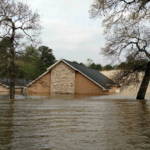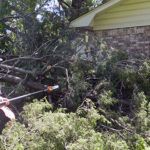HOUSTON—Hurricane Ike swept through the eastern one-third of Texas, prompting a massive evacuation, leveling much of Galveston and leaving huge areas of Southeast Texas in the dark. But glimmers of hope began to emerge as Texas Baptists aided relief and recovery efforts.
Ike made landfall in Galveston as a Category 2 hurricane, and then the storm cut a swathe through East Texas. About a week and a half later, electricity was starting to return to portions of Southeast Texas, and with it the fuel supply was increasing. Debris was beginning to be cleared, and people were starting to return to their homes in some areas.

Hurricane Ike hit the Texas Gulf Coast as a Category 2 storm, causing millions of dollars in property damage and displacing hundreds of thousands of people. (BGCT PHOTO/John Hall)
|
More than 320 Gulf-area churches affiliated with the Baptist General Convention of Texas were affected, and many more are included in the 29 counties declared a federal disaster area. Galveston and the Beaumont-Orange area appeared to be the hardest hit areas, said Gary Smith, Texas Baptist Men volunteer disaster relief coordinator. Galveston still had no power or services more than a week and a half after the hurricane made landfall.
Baptist Child & Family Services and Texas Baptist Men continue serving in the wake of the storm. Twenty-one Baptist conventions have sent disaster relief teams to serve in the wake of Ike, working in 38 Texas communities.
More than 1,500 TBM volunteers have given their time to help those affected by Ike. TBM feeding teams have prepared more than 420,000 meals. The TBM shower and laundry units also allowed people in affected areas to take more than 3,000 showers and wash about 1,600 loads of laundry.
BCFS, in cooperation with its partner churches, provides medical special-needs evacuees with specific dietary requirements, necessary medical attention and basic health and hygiene services during their stay.
“We have the resources to house these evacuees as long as necessary,” said Marla Rushing, BCFS director of corporate training. “Although we hope they can return home soon, we won’t send them away until we know it’s safe.”
 Sign up for our weekly edition and get all our headlines in your inbox on ThursdaysMembers of the Texas Baptist Men Disaster Relief team from Gregg Baptist Association prepare meals to help with relief operations after Hurricane Ike hit the eastern one-third of Texas. (BGCT PHOTO/John Hall)
|
Some evacuees were in no hurry to leave because of the relationships and care given through BCFS and host churches. One Corpus Christi evacuee was so pleased by the care he received through BCFS at Northeast Baptist Church, he plans to move to San Antonio and join the church.
“When Harvey Lopes first arrived at our shelter, we thought he was the bus driver. He was helping everyone off the bus and giving us a brief synopsis of their medical conditions,” shelter manager Skip Holman said. “We were shocked when we realized he was an evacuee.”
Lopes spent his time at the shelter serving meals and ensuring other evacuees had everything they needed. At one point, shelter volunteers even had to restrict Lopes from helping due to his own medical condition.
Lopes stayed at Northeast Baptist Church five days with his wife and their four children, one of whom qualified as a medical special-needs evacuee and was their reason for staying at a BCFS shelter.

Joshua and Kristin Loflin, members of Calvary Baptist Church in Beaumont, stand in front of their flooded home in LaBelle. They lost all their furniture, appliances, clothes and the toys of their two children—Michaela, 3, and Malachi, 1. (NAMB PHOTO)
|
After returning to Corpus Christi, Lopes immediately called the shelter to thank the volunteers once more for their kindness.
“We want to get them back to San Antonio as fast as possible,” said Ann Parsons, assistant shelter manager. “We loved their family, and they loved us.”
In addition to running medical special-needs shelters in San Antonio, the BCFS incident management team continues to provide management for the Texas Department of State Health Services operations for Texas Task Force Ike in Galveston.
Classes resumed Sept. 22 at Houston Baptist University, eight days after Hurricane Ike caused an estimated $8 million to $10 million damage to the campus.
The university’s student center and administrative complex suffered significant wind, water and structural damage during the storm, but student residences were undamaged, and classroom buildings largely were unaffected as well, HBU President Robert Sloan said in a statement posted on the school’s website.
Although the campus was without power for a week, emergency generators provided crucial support for staff and students who weathered the storm on campus, Sloan said. Cool, clear weather allowed cleanup crews to make progress on recovery efforts.

Baptist Child & Family Services personnel join other members of Texas Task Force Ike outside Ball High School on Galveston Island to survey damage and plan relief strategies to help victims most affected by Hurricane Ike. (BCFS Photo)
|
The university’s computer network returned to service the morning of Sept. 21 after servers were moved to an off-site location where electrical power was available, according to a statement from Charles Fix, interim director of HBU’s information technology services. By that evening, electrical power had been fully restored to the campus, and Sloan announced classes would resume at 10 a.m. the next day.
In the statement posted Sept. 19, Sloan praised students and staff for the patience and good spirit they demonstrated during the chaotic week after the storm struck.
“As we see more images from the storm’s destruction, we realize more and more how many are suffering in our area,” Sloan said. “We know that nothing happens outside the love of Christ, and it is that belief that keeps us strong. We pray for God’s peace for those who have lost loved ones, homes, pets and that sense of normalcy that we all take for granted.
“One of our challenges this week has been that our administrative team is working without access to their offices and files. Today’s wireless technology—cell phones, air cards, laptops—has been invaluable. Our remote access to our website has allowed us to keep our HBU homepage updated with information. Our emergency alert system has served us well and has given us the capability to send phone and text-message campus updates to our faculty, staff and students on a daily basis.

Bob Childres (left) from Immanuel Baptist Church in Paris visits with BGCT Executive Director Randel Everett at the Texas Baptist disaster relief field kitchen at League City. (BGCTPhoto/John Hall)
|
“Our students who remain on campus and have been here since the storm are in good spirits. There is a definite bond among these young people, built on prayer, friendship and youthful optimism. I met yesterday with our faculty and staff who were able to get to campus. We prayed together, hugged familiar faces and shared our stories. There was a peace to that gathering and a strength that comes from knowing God’s grace and goodness.”
Students who remained on campus helped other storm victims by volunteering for Houston’s End Hunger Network and Neighborhood Centers. The university has established a “Student Success Fund” for donations to help students and their families who suffered losses due to the hurricane.
Less than 24 hours after Hurricane Ike hit Houston, Parkway Place Executive Director Chuck Childress reported power was restored to the Buckner retirement community, and service crews already were making repairs and performing cleanup. The restoration of power also restored air conditioning to the community and halted earlier contingency plans by Buckner Retirement Services to move residents to other retirement facilities because of the heat.
Early reports from observers indicated moderate damage to Buckner Children’s Village and the Calder Woods retirement community.
Residents at Gracewood—a Children at Heart Ministries facilities in Houston for single mothers with children—“rode out the storm, emerging to find evidence of Ike’s fury all around them,” said Don Cramer, vice president and chief operating officer for the Children at Heart Foundation.
“Wood fences and chain- link fences were down, trees had blown over and debris was everywhere. The power of the storm was evident in branches and boards embedded several inches into the ground where they had been hurled by the winds. Even the children’s playscape area was damaged by a falling tree. But God is good, and no one was hurt.”
Personnel at other Chil-dren at Heart facilities helped with relief and recovery. A maintenance team from Texas Baptist Children’s Home in Round Rock provided a generator. Residents from one of the cottages in Round Rock and at Miracle Farm in Brenham helped clear away debris.
Baylor University School of Social Work students under the direction of Jim Ellor visited and comforted 20 evacuees with dementia who were relocated to a Waco nursing home when the storm knocked out utilities at the facility where they live.
The nursing home residents already had been uprooted a short time earlier due to Hurricane Gustav.
“For persons with serious dementia, numerous changes in location and caregivers are particularly stressful,” said Helen Harris, senior lecturer in the Baylor School of Social Work.
The students “calmly and competently visited with persons who needed presence and caring and reassurance,” Harris said. “They were skillful social workers. They were tender ministers. They met ‘the least of these’ and saw the face of Christ. And I saw the face of Christ in them.”
Reporting by Haley Smith, John Hall, Russ Dilday and Mark Kelly, with additional information provided by Diana Garland.














We seek to connect God’s story and God’s people around the world. To learn more about God’s story, click here.
Send comments and feedback to Eric Black, our editor. For comments to be published, please specify “letter to the editor.” Maximum length for publication is 300 words.